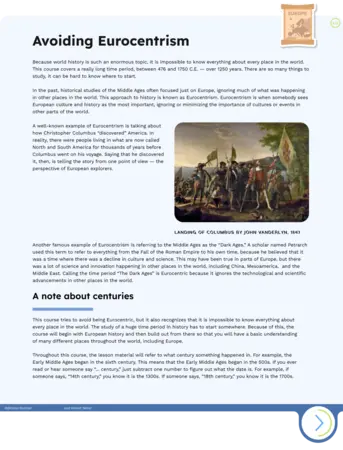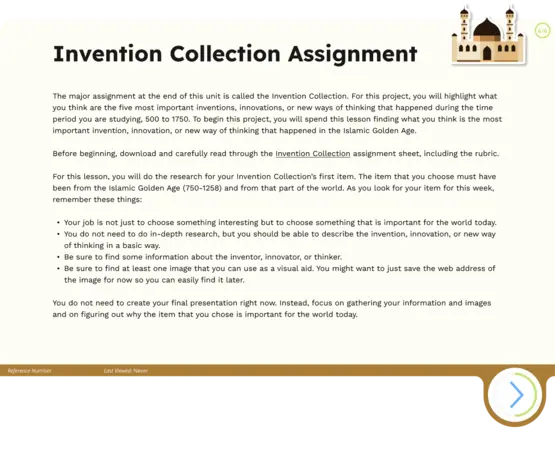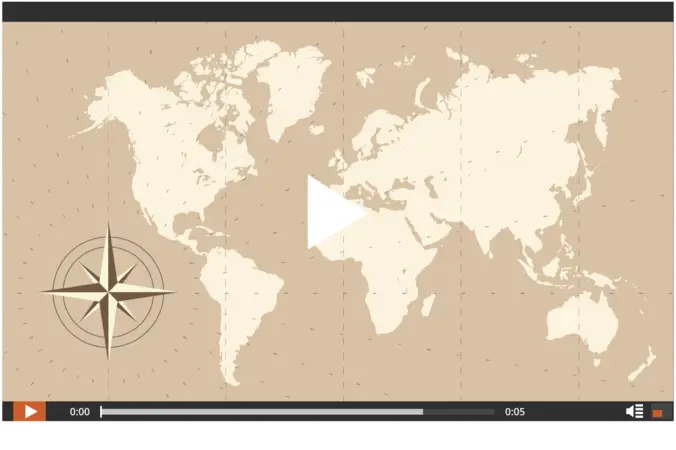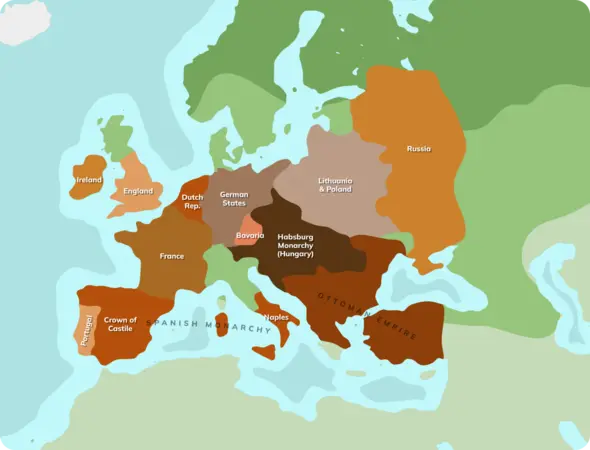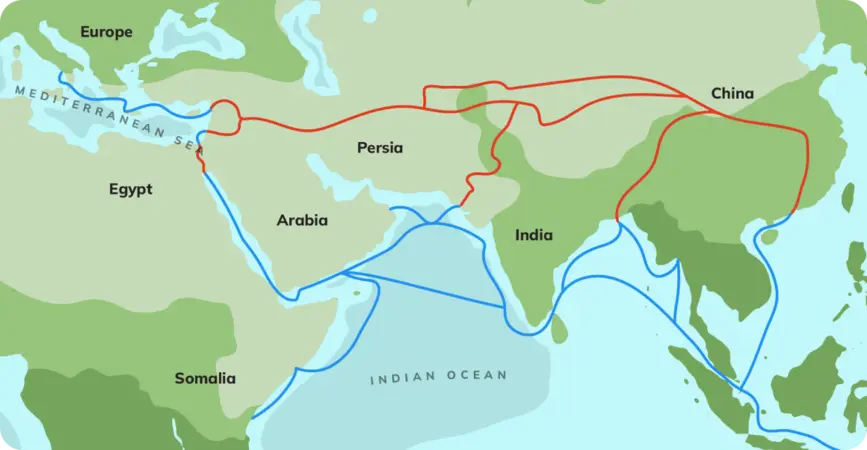Social Studies 8
What would happen if all of history were written down in one really big book? The book would be so long and so complex that there would be no way for any one person to know everything in it. What if, though, instead of learning the whole book, a person just started learning from the time that they were born? Again, there would be far too much for them to ever learn about, but there would be another problem as well: They would quickly become confused. After all, everything that happens in a person’s lifetime depends on events that happened before their life began. We cannot understand the chapter we are in unless we understand earlier chapters.
Social Studies 8 asks this important question: How does learning about the past help us understand today? The course covers almost 1250 years of history, from the beginning of the Middle Ages to 1750. The course provides a broad overview of the time period, not focusing solely on European history, but also covering the Near East, Mesoamerica, Imperial China, pre-Confederation Canada, and other places in the world. Hopefully, by giving students a broad flyover of world history as a whole, they will come to a greater understanding of how all of human history is connected, leading to the world becoming the way that it is today.
While the BC Curriculum focuses on the 7th century to 1750 C.E., this course focuses on 476 to 1750 C.E. The course authors determined that earlier context was needed for students to understand what followed, so some attention has been given to the Fall of Rome and the Early Middle Ages.
The StudyForge Difference
StudyForge Social Studies 8 can be taught in an online asynchronous, online synchronous, hybrid, or face-to-face format. Most readings include multiple pedagogical layers to enhance student learning, including an audio file, fill-in-the-blank note-packages with key words highlighted in the text, and regular formative quizzes. Students can also retake every quiz, which are randomized, to encourage them to strive towards mastery. Challenging vocabulary words are tagged with hover-over definitions so students can develop their vocabulary without needing to go to external sources. Assessments and activities are thought-provoking and engaging, such as an Invention Collection, which looks at key technological developments from around the world, or Make a Medieval Meal, in which students find an online recipe to make a medieval dish. A timeline at the top of every relevant lesson helps orient the students to the lesson’s time period, also indicating the eras that are happening concurrently elsewhere in the world.
Table of Contents
- Lesson 1: Introduction to Social Studies 8
- Lesson 2: Getting the Big Picture
- Lesson 3: Major Eras in Europe
- Lesson 4: Europe at the Beginning of the Middle Ages
- Lesson 5: Islamic Caliphates in the Early Middle Ages
- Lesson 6: The Tang Dynasty in China
- Lesson 7: The High and Late Middle Ages in Europe
- Lesson 8: The Mongol Empire
- Lesson 9: Mesoamerica Civilizations
- Lesson 10: The Renaissance and the Age of Enlightenment in Europe
- Lesson 11: The Ottoman Empire
- Lesson 12: Africa and the Transatlantic Slave Trade
- Lesson 13: Map and Timeline Completion
- Lesson 14: Unit 1 Review and Test
- Lesson 1: Feudalism
- Lesson 2: Would I Want to Live in a Feudal System?
- Lesson 3: Feudalism Paragraph
- Lesson 4: Medieval Households
- Lesson 5: Daily Medieval Life
- Lesson 6: Food in Medieval Europe
-
- Lesson 7: Homes and Structures
- Lesson 8: Cathedrals
- Lesson 9: Medieval Castles
- Lesson 10: Medieval Weapons and Armour – Enrichment
- Lesson 11: Knights and Chivalry
- Lesson 12: The Crusades
- Lesson 13: Topic Selection and Research
- Lesson 14: Creating Your Presentation
- Lesson 1: Inventions and Innovations: The Islamic Golden Age
- Lesson 2: Invention Collection: Islamic Golden Age
- Lesson 3: Inventions and Innovations: Imperial China
- Lesson 4: Invention Collection: Imperial China
- Lesson 5: Inventions and Innovations: Renaissance Europe
- Lesson 6: Invention Collection: Renaissance Europe
- Lesson 7: Inventions and Innovations: The Scientific Revolution
- Lesson 8: Inventions and Innovations: The Age of Enlightenment
- Lesson 9: Invention Collection: Post-Renaissance Europe
- Lesson 10: Invention Collection: Other Inventions, Innovations, and Ideas
- Lesson 11: Invention Collection Creation
- Lesson 1: The Silk Road
- Lesson 2: Cultural Exchange on the Silk Road
- Lesson 3: Marco Polo
- Lesson 4: True Story or Tall Tale, Part 1
- Lesson 5: True Story or Tall Tale, Part 2
- Lesson 6: The Age of Exploration
- Lesson 7: God, Gold, and Glory
- Lesson 8: Causes and Consequences
- Lesson 9: Age of Exploration Maps – Enrichment
- Lesson 10: Columbian Exchange
- Lesson 11: Exchange Change Letter
- Lesson 12: Asking Moral Questions About History
- Lesson 13: Responding to Moral Questions About History
- Lesson 1: Indigenous Ways of Life Before Colonization
- Lesson 2: Indigenous Warfare and Alliances
- Lesson 3: Indigenous Land and Territory
- Lesson 4: John Cabot
- Lesson 5: Jacques Cartier
- Lesson 6: Henry Hudson
- Lesson 7: Samuel de Champlain
- Lesson 8: Le Filles de Roi
- Lesson 9: Indigenous Relations with French Settlers
- Lesson 10: Radisson and des Grosseilliers
- Lesson 11: Life in the Hudson’s Bay Company
- Lesson 12: The Settlement of Halifax
- Lesson 13: Telling Canada’s Story
- Lesson 1: Final Project Preparation
- Lesson 2: Final Project Writing
- Lesson 3: Final Project Creation
- Lesson 4: Project Finalization
Course Features
- Deliberately global focus to avoid Eurocentrism
- First unit provides a basic overview of world history from 476-1750, giving students a framework to attach all other knowledge to as the course progresses
- Appeals to multiple learning styles with a variety of choice in completing major assignments and projects
- Timeline on every lesson orients students to the time period the lesson covers and what is happening elsewhere in the world
- Every content lesson has a note package with a fill-in-the-blank outline; keywords are underlined in the text to indicate their significance for students
- Frequent quizzes allow students to refresh key information regularly
- Vocabulary includes hover-over definitions so students can build vocabulary without needing to go to external sources
Experience a lesson as your students would
